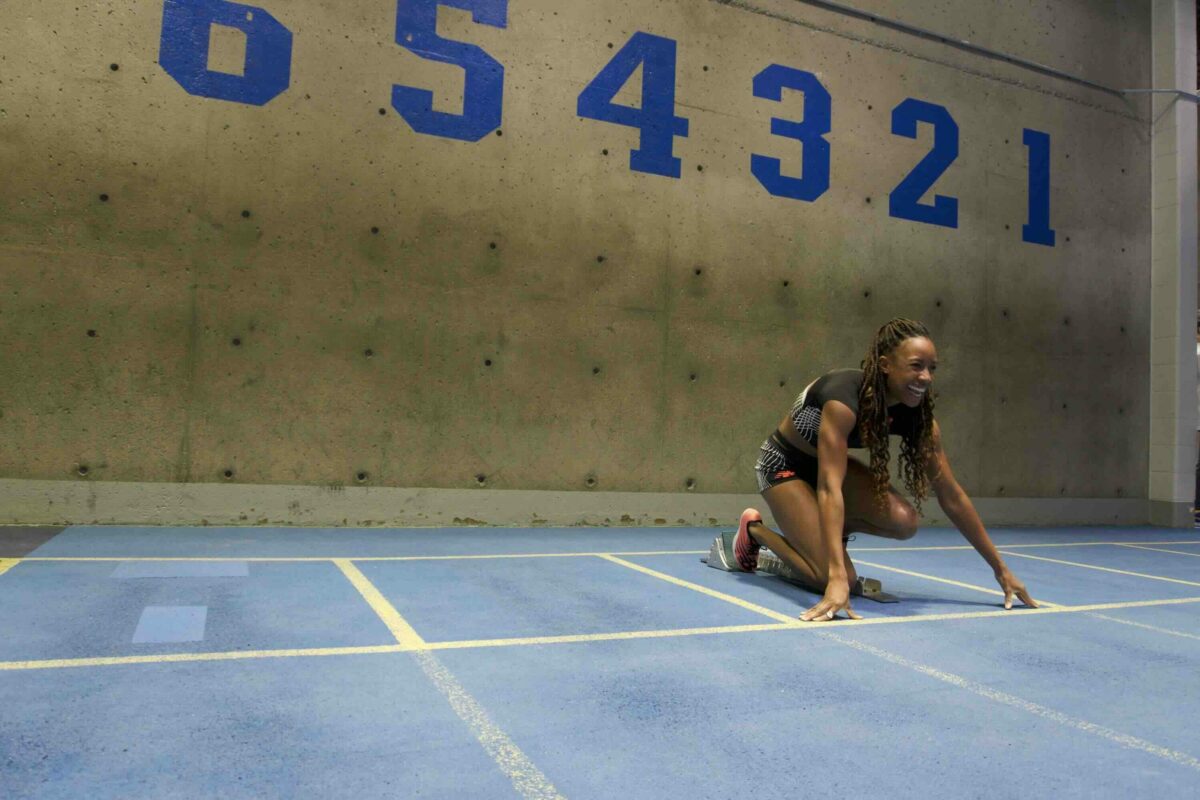
When Canadian 2022 Commonwealth Games gold medallist and Rio 2016 Olympian Micha Powell wrote her memoir/workbook, Sprinting Through Setbacks: An Olympian’s Guide to Overcoming Self-Doubt and Imposter Syndrome, her goal was to inspire the next generation of young women going after their biggest goals on the track and beyond. Her book, co-authored with Molly Hurford, showcases stories from Powell’s decade of professional racing experience, including vulnerable stories of growing up in the shadow of two Olympian parents, navigating injury and finding the courage to embrace an Olympic mindset.
After a tough time at the Bell Canadian Track & Field Trials in Montreal on the weekend, Powell has her sights set on fully recovering from a hip injury while finishing the season strong. Though she didn’t advance to the 400m finals, she placed second in her 200m semi-final before finishing sixth in the final on Sunday.

Powell was born in Montreal to three-time Olympian Rosey Edeh and long jump world record holder Mike Powell, so you could say athletics is in her DNA.
Here, the sprinter shares her best advice for runners—and a sneak peek at what readers will find in her book.
Commonwealth Games sprint medallist Micha Powell to release inspiring memoir
Why do a book now, when you still have a lot of your career left?
Ideally, I want to keep racing for another four years, into the next Olympic cycle. I decided that I wanted to bring a book out now, because I thought, I don’t want to put out a memoir when I’m done with track, where it will feel more like I’m reflecting and trying to cope with letting go of my running career, getting some closure. I wanted to do this now, while I’m still running and it’s so fresh–the memories, the accomplishments, the setbacks—and writing it while I’m still in the journey and learning.

What will the book bring to readers?
I’m so so proud to be able to bring this book to life and share it with the running community and with anyone who wants some insight on how to get through setbacks, and how to achieve their goals in whatever field they’re in.
Best tips for start-line nerves?
When you’re a sprinter, you need to be able to control start-line nerves and channel them into something positive, because every single millisecond of racing counts—so you can’t afford to let nerves mess up your start!
Journalling beforehand has always helped me get focused and calm by the time I’m on the start line. Writing out in-race process goals so clearly helps you focus on what really matters. You’re training your brain to do what you want it to do in the race.

What’s your best advice for a post-race routine?
My best advice is to have a post-race routine! First, I think about how to best let my body decompress. For me, that’s obviously a good cooldown. You need to take a few minutes and jog or walk, to just help your body start calming down, which can be hard.
I also love taking a few minutes to jot down some notes in my journal about how a race went. Writing it down is so key, because your brain is speeding with adrenaline, and it’s easy to forget details that could be important later. I try to grade myself on things like warmup, in-race execution, and the finish. I try to be honest and write out what went well, along with anything I need to work on for next time. After I write it down, I close the journal—I don’t dwell on the race.
Finally, treat yourself! I like having something to look forward to after races, even having a piece of good chocolate waiting for me at home. It doesn’t need to be something big—just a little something that makes your heart feel warm.
Obviously, sprinters are different from endurance runners, but even endurance runners could use more power. What are your best tips for developing that run power?
Everyone should be strength training! I do weights three times a week. Strength training really helps you be more explosive and efficient as a runner. We use our cores a lot in sprinting, but you need a strong core for endurance as well.
In the off season, I would suggest that you try to get as strong as you can—and then you can take that strength into your next race season and shift from building strength to maintaining it.
In season when you’re doing high mileage, make sure you’re not losing too much muscle. Don’t skimp on protein at meals! And at least once a week, try to incorporate some sprints into your running routine, no matter what your goals in running are. That speedwork really helps you build power.
Sprinting Through Setbacks: An Olympian’s Guide to Overcoming Self-Doubt and Imposter Syndrome and the accompanying workbook entitled Sprinting Through My Setbacks are available now.




